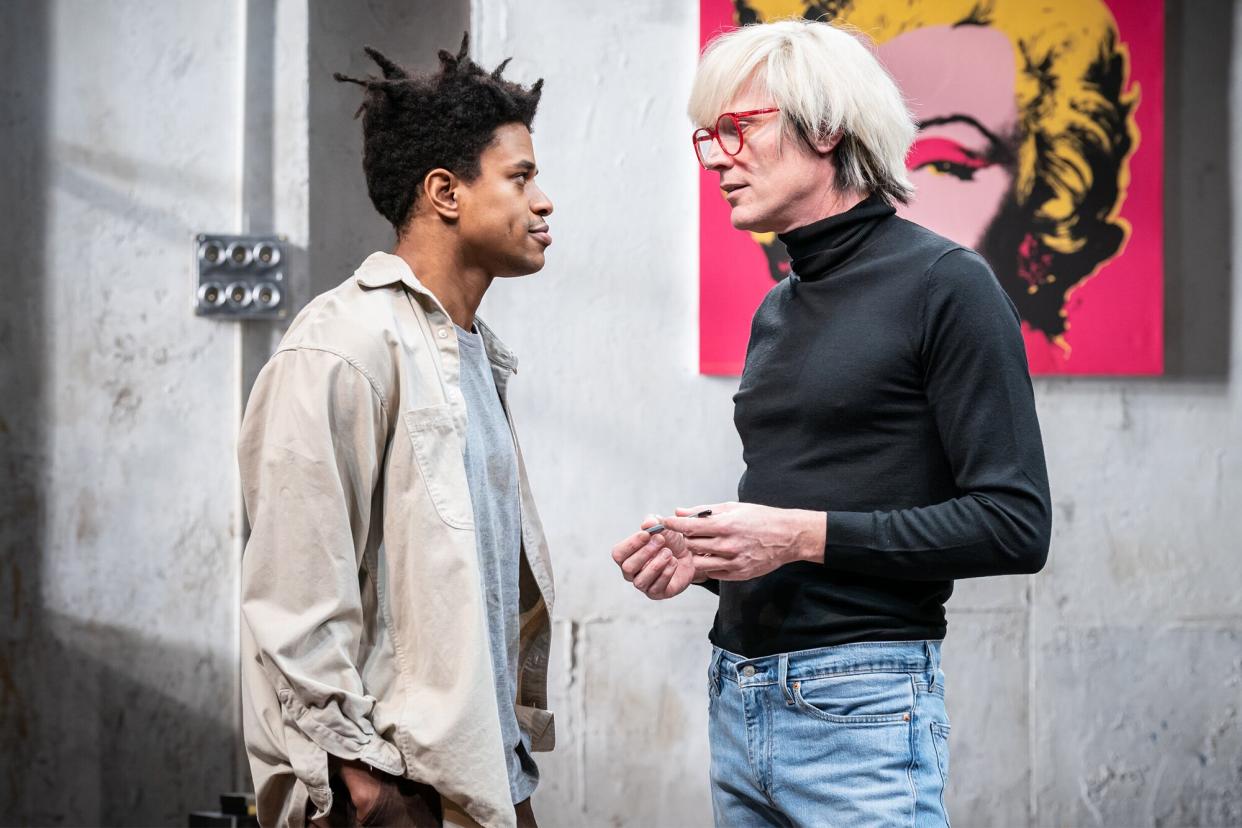The Collaboration review: When Warhol met Basquiat, and sparks (sort of) flew

- Oops!Something went wrong.Please try again later.
- Oops!Something went wrong.Please try again later.
"It's not what you are that counts," Andy Warhol, eternal fan of misdirection, once said. "It's what they think you are." And what we think we know about two of the 20th century's most documented figures is pretty much what we get in The Collaboration, a competent, pleasant, and oddly inert portrait of Warhol's late-life creative partnership with Jean-Michel Basquiat, now playing at the Samuel J. Friedman Theatre.
The plasticized king of Pop Art and the dreadlocked bad boy of Neo-Expressionism were hardly fans of one another's work, despite the cultural real estate they shared in the New York scene of the early 1980s — and they may have carried on forever as distant adversaries were it not for the concerted efforts of their shared dealer, a longtime gallerist and collector from Switzerland named Bruno Bischofberger (played here with affable, undimmable patience by Erik Jensen). His matchmaking, it's made clear in the opening scenes, did not come easy: "You're such a traitor, Bruno. I thought the Swiss were supposed to be dependable," Paul Bettany's Andy protests when Bischofberger first suggests a meeting. "But you're always moving on to the hot new thing."

Marc Brenner Jeremy Pope and Paul Bettany in 'The Collaboration'
Jean-Michel, played with sweet, itchy bravado by Jeremy Pope, is undeniably a hot thing, even if Warhol dismisses the work itself in his signature nonplussed drawl as "so ugly and angry and yeah, well, kinda violent." (Basquiat repays the favor: His elder rival's output, he sniffs, has "has no soul. I'm Dizzy Gillespie blowing a riff, he's one of those pianos that plays all by itself.") Nevertheless, Bruno persists, and a summit ensues in which the two, wary and prickling, finally end up alone together in the same room.
Over the next 120 or so minutes, they'll find their way toward each other through feints and jabs and small grudging concessions that eventually tip into genuine friendship, or at least a convincing approximation of one. (Creatively, too, their partnership sparked some of the most lauded work of their respective careers — though the muse remains mostly elusive here, a distant second to the idea of art.) Warhol, still reeling from a near-fatal assassination attempt, keeps circling thoughts of mortality and obsolescence, even as he rarely fails to list his starry social engagements or the price of every taxi cab it took to get there; Basquiat, the restless embodiment of youth in revolt, zooms in repeatedly on his companion's enduring obsession with soup-can artifice and his seeming inability to pick up a paintbrush.
Director Kwame Kwei-Armah's sleek production has arrived largely intact from a hit run on London's West End, and it's not hard to see why it succeeded; as recent blockbuster exhibitions and sales figures show, both men continue to capture the public imagination in ways that remain seemingly undiminished after their respective deaths nearly 40 years ago. The staging here is clean and evocative — a paint-strewn studio lair, a few arty slide projections, some clever lighting tricks — and the wig work (three individual designers are credited) hard to fault.
But the script, by four-time Oscar nominee Anthony McCarten (The Theory of Everything, The Darkest Hour) remains frustratingly earthbound, a squared-off reimagining of events that have long passed into myth. Warhol is, beneath his signature pale thatch, the same man we've often met on stage and screen: fussy, deadpan, prone to grandiloquent statements and bitchy asides that Bettany — too movie-star handsome, perhaps, but still a physical ringer — delivers in an unsteady accent that often wobbles, alas, more towards Notting Hill than Pittsburgh. (Into the Woods' Krysta Rodriguez, as Jean-Michel's erstwhile lover, seems more categorically miscast, delivering her lines with so little depth or inflection it's as if she's reading them for the first time.)
Pope, who earned two Tony nods in the same season for his astonishing turns in Choir Boy and Ain't Too Proud: The Life and Times of the Temptations, often appears to be yearning for a different, deeper play: He paces the stage like a caged cat, balancing Basquiat's cool, heavy-lidded exterior with the bristling energy of a born outsider. Having spent most of his young life as a Black man frequently on the wrong side of the law, Jean is devastated when an old friend from his graffiti days is targeted by police officers and brutally beaten off stage. The ugliness of that incident — and the scattered references to the heroin habit that will eventually kill him — offer rare real-world intrusions in a story that often otherwise feels sealed off in its cozy living-room cocoon of banter and bickering.
By the second half, the actors have etched out a sort of cautious tenderness with one another, the chamber-piece intrigue of their back-and-forths comprising whatever scant dramatic tension there is. But the story unfolds with so little urgency or new information that it feels not unlike passing through a museum gift shop: Here are a few anecdotes and trinkets to take home, something comfortably concrete on which to hang the vast unknowability of modern art. There's a soundtrack, too; showgoers are greeted by an onstage DJ who fills the gaps between acts with shimmering hits from the era — Chaka Khan, Whitney Houston, Grandmaster Flash. You can't help but be moved by that joyful noise, even if it seems, like so much of what's happening here, more like a shortcut to feeling than the thing itself. Warhol would be proud. Grade: B–
Related content:

